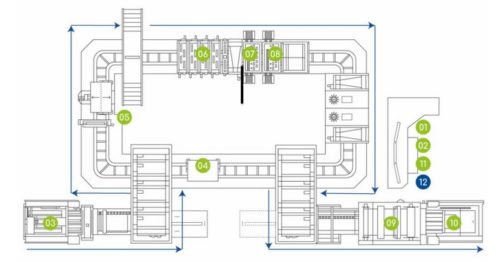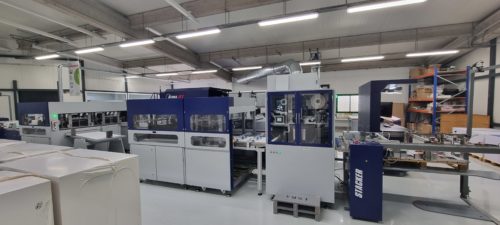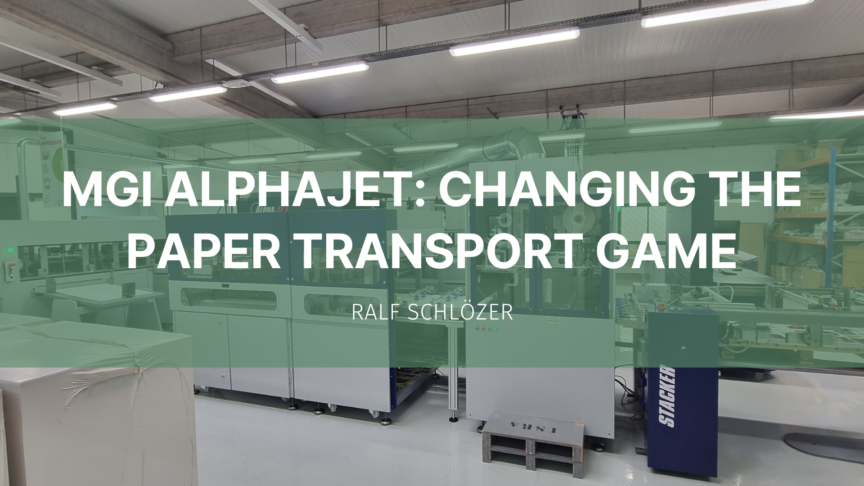The AlphaJET B1 inkjet press has been some years in the making when MGI officially launched the AlphaJET in October 2022. Already at drupa 2012, MGI showcased a B2 inkjet device labelled AlphaJET, which had little in common with the B1 press previewed at drupa 2016. This prototype featured a unique substrate transport and a modular build. It took some further refining to get to the stage when the press was finally launched including a first beta site in operation.
A recap of the technology
The AlphaJET press and underlying technologies have been described in articles before. Still, I would like to recap some of the main points. At the heart of the press are a set of mobile suction trays (number 04 in the schematic drawing below), driven by electromagnetic linear motors. Like a magnetic train, they however and move on a circular track and allow for high-precision positioning and swift acceleration. Instead of sheets held on and transferred by cylinders or belts the substrate remains fixed on one tray during the whole printing, drying and finishing process. In a feeder (3) the sheets are loaded onto the trays and are piled in a delivery (10) after having made most of the circle ride. A scanner (5) checks for registration of a sheet on the tray.
Several print and embellishment modules can be included. A high-resolution process colour printing module (6) based on Memjet’s Duralink technology prints the process colour image. With 1,600 x 1,600 dpi resolution and water-based pigment ink a high quality can be achieved. UV spot varnish (7) and protection varnish (8) modules can be added before the drying station. Right before the delivery a hot stamping module (9) can add further embellishments.
In earlier presentations, additional print, embellishment, and finishing modules were discussed. The modular concept centred on tray sheet transport certainly would allow for that.
MGI made sure that inks, varnishes and foils are deinkable and the whole process is eco-friendly.

Schematics of AlphaJET printer (sheet transport in blue)
The first installation
While MGI is very experienced in embellishment devices and previously offered digital (toner) presses with the Meteor line as well, it certainly was no easy task to get all components working together reliably. In March 2022 MGI announced the first beta site at the French card printer ISRA. The company is producing all kinds of smart, security or identification cards, with the latest innovation being environmentally friendly “zero plastic” cards.
The AlphaJET installed has the full configuration with process colour inkjet print, UV-inkjet for spot coating, overprint varnish and a foiling station. For ISRA the production of cards has been condensed from five main steps into one. This helps in staffing as personnel is hard to recruit. As this is the first digital press for ISRA, offset press operators are running the AlphaJET.
The AlphaJET at ISRA started production in September 2022 and the company has produced several millions of cards already on the AlphaJET. As orders surpass one-shift capacity the company is currently adding a second shift. The press is not only helping ISRA in producing environmentally friendly products, it cuts minimum orders and delivery times considerably.

AlphaJET at ISRA
Moving from there
According to Victor Abergel, Executive Vice President at MGI, the next orders for the AlphaJET are already in and an announcement will likely be made by the end of February. Altogether there should be two to five new installations in Q1. The first new installation will be in packaging for single sided printing on various substrates. Set to follow are an online printing company and a hybrid printer, producing commercial and packaging work. According to Abergel more than 40 companies have already seen the machine and about half were described as hot prospects. All installations for the first half of 2023 will be in Europe.
The US launch is planned for February 2023. A demo machine is already installed at the Konica Minolta HQ in the US, but as delivery times are six months, the first US installation is still a bit off. Konica Minolta has a considerable stake in MGI and both companies are already cooperating in sales and service for the embellishment lines. Likewise, the AlphaJET sales and service will be conducted by KM and training is already underway.
An advantage for packaging and specialty print markets is the wide substrate range possible by the unique sheet transport. The substrate range is currently set as 140 gsm to 800 gsm or up to 2mm thickness. The tray transport as well as the inkjet technology would allow for much higher substrate thickness, but feeder and delivery are the limiting factors for now. With the right feeder and stacker heavier or specialty substrates, e.g. pre-cut puzzles, would be possible.
The press can take coated and uncoated papers, carton and synthetics. As priming the substrates is advisable, MGI offers the near-line Alphacoater priming station.
With packaging in mind an extended colour space or white ink could be of interest, but Abergel states that prospects found the colour space of the Memjet heads sufficient and do not need white so far.
A second UV spot coater module will be available soon to allow for foiling and spot UV coating at the same time. Also finishing modules will be available soon. MGI won an innovation award at All4Pack in November 2022 when presenting the Octopus technology. Shown as digital cutting, perforating and creasing solution for label printing on a web, it is set to be adapted for the AlphaJET. The Octopus uses several 4-axis cutting heads with interchangeable tools for variable or short run cutting.
Future paths
The AlphaJET is so flexible that it is difficult to judge the market impact. The opportunity to add a wide range of embellishments inline is quite unique. With its current portfolio and expertise, MGI is well-placed to add inline enhancement options.
There are portions in the well-established markets (packaging, commercial, publishing) that would need a lot of embellishments. There are other specialty markets like card printing that are promising targets as well. However, not every printer has a strong focus on embellishments and for others duplexing capabilities will be important.
Particularly the potential of specialty markets is difficult to judge. The trays would allow for a much wider range of substrates than traditional sheet transports allow. MGI has even expertise in feeding and separating sheets via the Köra-Packmat subsidy in Germany, which would enable custom solutions. Specialty applications could require additional print or finishing features, however, the AlphaJET would be modular enough to accommodate those.
The speed of up to 1,800 B1 sheets per hour seems moderate. According to Abergel this is due to the drying capacity and avoiding drying artifacts – while the transport and inkjet units could go much faster. Future progress in drying technology should allow for faster speeds which would help the economics of the press.
MGI states that the AlphaJET is a single-pass industry 4.0 print factory and offers unlimited opportunities. This might be a bit overstated, but the press is the most flexible production on the market. It certainly can help streamline production for products needing multiple print, embellishment and finishing steps. Reducing labour and manual handling steps are additional benefits. We will keep an eye on the AlphaJET and plan to comment on future progress and installations.

